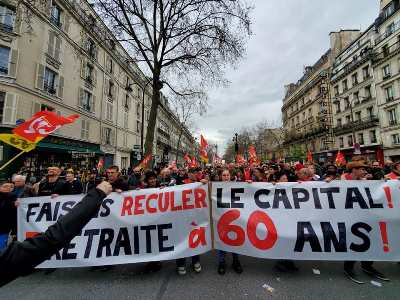
President Macron has officially passed his pension-busting law in France by a legal power grab, using articles 49-3. This despite more than two months of strikes and demonstrations this winter, involving millions of workers. The response to Macron’s latest assault was massive and determined. On Thursday, 23 March, monster demonstrations approaching 3.5 million took place in the streets. Small towns have broken participation records.
In reality, Macron’s attitude had the effect of an electroshock among workers and young people. And in the parades many strikers were young workers from many small private companies and a greater number of young high school students and students. For some, it was their first or second strike and demonstration. It was clear to them that the timing was critical and that we had to be there.
Violent repression
Macron had decided in advance of the day of strike on Thursday 23 March to put oil on the fire. In a particularly arrogant interview, Macron, on Wednesday 22 March, reaffirmed his willingness to enforce the law in the autumn. And its violent logic has been translated on the ground by a violent repression in many cities, resulting in serious injuries: a railway trade unionist lost his eye when he was hit by a LBD bullet, and a thumb was torn off a combative demonstrator in Rouen. And special police groups, such as BRAV and BAC, have bludgeoned, harassed, and insulted the demonstrators, especially the youth.
In the world of work, threats of dismissal are multiplying. And a circular of the Minister of Labour, Dussopt, was revealed, listing the means to facilitate dismissals for serious misconduct. This is happening at a time when the government has begun to requisition workers in refineries and waste disposal facilities.
The whole of last weekend was marked by rallies against repression, including anti-racist demonstrations against the Darmanin law which is aimed against foreigners, expelling some more easily. Anger is building up and is making the situation even more unstable and uncertain for Macron.
Not content to have launched its special police corps against the demonstrators, the government practiced a systematic and undisputed repression against environmental activists in Sainte-Soline in the Deux-Sèvres. The toll is heavy; three people in a life-saving emergency; five seriously wounded and more than two hundred wounded by ‘grenades’ and flash balls.
The government takes the same attitude as during the yellow vest movement. And Macron is betting on fear mongering, so that fewer young people and workers will come out to protest. But the situation will not lend itself to this tactic.
Extending strikes
Part of the labour movement is heavily involved in the battles. Several sectors are resisting and maintaining their renewed strike, since 7 March, for the most part, despite the requisitions and the duration of the movement. This is the case in refineries, energy and gas, and railway and dock workers. Strike funds exist and multiply. Strikers from other sectors often come to support through social networks.
However, the rest of the young people and workers have very little opportunity to enter a more powerful strike. The intersyndicale, the grouping of trade unions calling the protests remains united, announces a new day of strike action after the last one. L’intersyndicale calls for a general assembly to decide on the strike but it is often very abstract. In many companies, it is very difficult to organize in the workplace, especially when union teams are weak or non-existent. It is part of the traditions of struggle that must be relearned collectively (leaflets, picket lines, strikers’ meetings and votes for action…) Yet in the struggle things can accelerate. The potential is huge to be able to stop Macron.
The militants of the Gauche révolutionnaire (CWI France) have increased their output of material (leaflets, newspapers, etc.) to start a discussion with young people and workers in the demonstrations and on the picket lines. We also firmly maintain our regular activities of stalls in the streets to address the majority of people who look at the movement with sympathy. Interest in politics is growing everywhere. And our leaflets and newspapers are rapidly taken. The situation raises many political questions that validate the need to build a mass revolutionary party for socialism. And for that, join the Gauche révolutionnaire !
Special financial appeal to all readers of socialistworld.net |
Support building alternative socialist media Socialistworld.net provides a unique analysis and perspective of world events. Socialistworld.net also plays a crucial role in building the struggle for socialism across all continents. Capitalism has failed! Assist us to build the fight-back and prepare for the stormy period of class struggles ahead. Please make a donation to help us reach more readers and to widen our socialist campaigning work across the world. |
Donate via Paypal |
| M | T | W | T | F | S | S |
|---|---|---|---|---|---|---|
| 1 | 2 | 3 | 4 | 5 | ||
| 6 | 7 | 8 | 9 | 10 | 11 | 12 |
| 13 | 14 | 15 | 16 | 17 | 18 | 19 |
| 20 | 21 | 22 | 23 | 24 | 25 | 26 |
| 27 | 28 | 29 | 30 | 31 | ||

